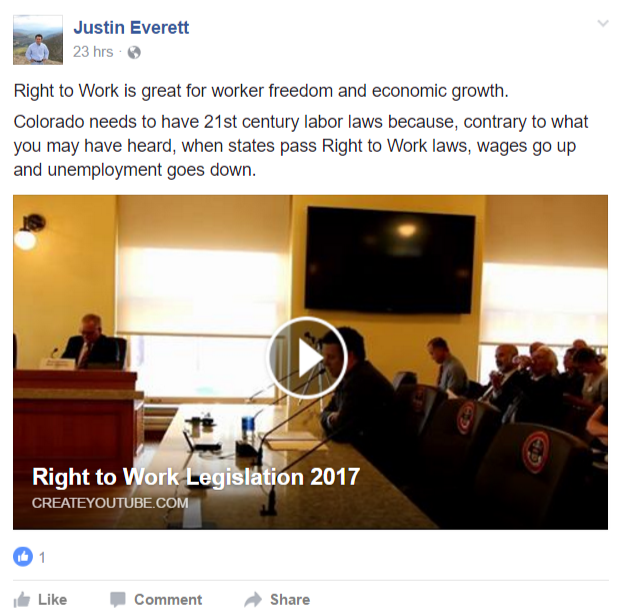Colorado State Rep. Justin Everett (R-Littleton) posted this on Facebook recently. It’s an assertion without evidence that “contrary to what you may have heard…wages go up and unemployment goes down” in so-called “Right to Work” states.
In reality—which I like to determine by looking for studies and evidence rather than consulting standard Republican talking points—the opposite is true.
In a study completed in 2012, the Economic Policy Institute found the following:
Unions have a significant and positive effect on the wages and benefits of union and nonunion workers alike. Unionized workers are able to bargain for better wages, benefits, and work conditions than they would otherwise receive if negotiating individually. The effect on the average worker—unionized or not—of working in a right-to-work state is to earn approximately $1,500 less per year than a similar worker in a state without such a law.
Another way to measure the effect of anti-labor “Right to Work” laws is their effect on a state’s Gross Domestic Product (GDP). Here’s what another scholar found:
12 of the 14 most productive states are worker-friendly states, while five of the six least productive states are RTW states. The median GDP per capita for the worker-friendly states is $41,529.50, compared to $38,745.50 in RTW states, and an application of the Mann-Whitney test shows significance at the 0.05 level.
In truth, the view that Everett espouses is right-wing dogma with no grounding in truth or data. As another study found, these laws may make a state more “business friendly,” but that does not translate into higher wages or better jobs for citizens, as Everett claims.
From a state’s economic standpoint, being right-to-work yields little or no gain in employment and real economic growth. Wages and personal income are both lower in right-to-work states, yet proprietors’ income is higher, ceteris paribus. As a result, while right-to-work states may maintain a somewhat better business environment relative to non-right-to-work states, these benefits do not necessarily translate into increased economic verve for the right-to-work states as a whole—there appears to be little “trickle-down” to the largely non-unionized workforce in these states.
Everett should be honest if he’s going to make an argument for Right To Work laws. He should simply say he values business owners over their employees. If he wants to destroy unions at the cost of lower wages for his constituents, he should be honest about it.





